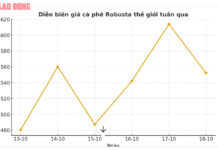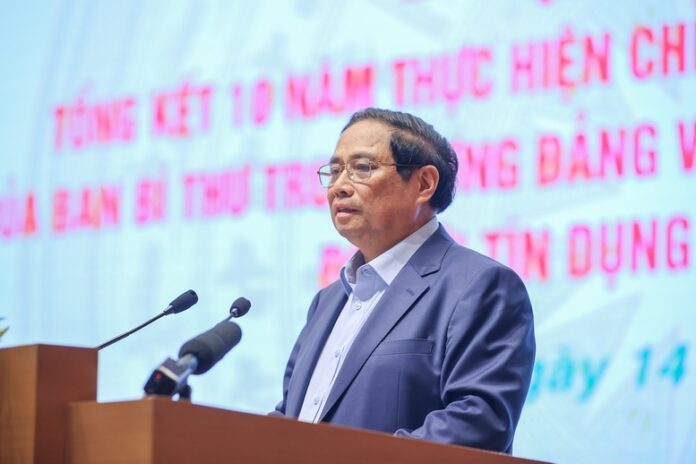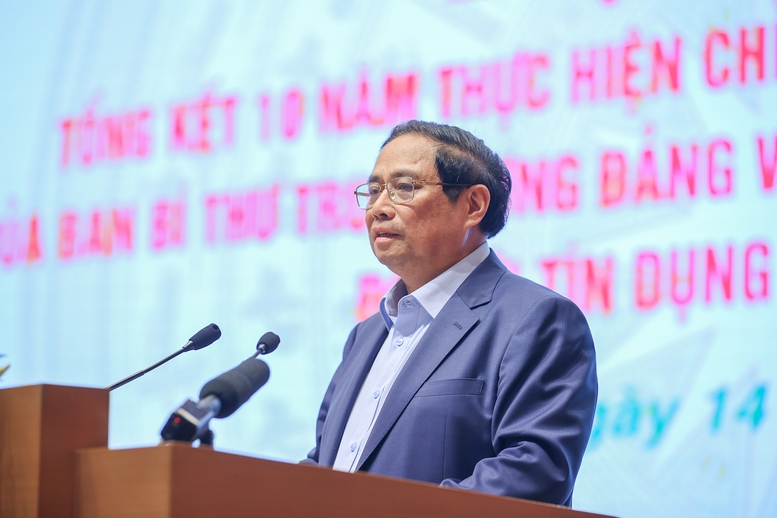
Prime Minister Pham Minh Chinh emphasized that the consistent and unwavering policy of the Party and State is to pursue economic development in tandem with social progress and equality, ensuring that all citizens benefit from socio-economic progress.
On the afternoon of August 14, Prime Minister Pham Minh Chinh chaired the conference on the 10-year implementation of Directive No. 40-CT/TW dated November 22, 2014, issued by the Secretariat of the Party Central Committee on enhancing the Party’s leadership over social policy credit.
The conference was held at the Government Office and connected to 63 provinces and centrally-run cities.
Also attending the conference were Governor of the State Bank of Vietnam Nguyen Thi Hong, Chairwoman of the Board of Directors of the Vietnam Bank for Social Policies; members of the Board of Directors of the Vietnam Bank for Social Policies: Minister-Chairman of the Committee for Ethnic Minorities Ha U Leng, President of the Vietnam Women’s Union Ha Thi Nga, and President of the Vietnam Farmers’ Union Luong Quoc Doan; leaders of ministries, sectors, central agencies, and localities.
On November 22, 2014, the Secretariat issued Directive No. 40-CT/TW on enhancing the Party’s leadership over social policy credit. After five years of implementing this Directive, the Secretariat issued Conclusion No. 06-KL/TW dated June 10, 2021, on continuing the implementation of Directive No. 40-CT/TW.
To concretize the tasks and solutions for implementing Directive No. 40-CT/TW and Conclusion No. 06-KL/TW of the Secretariat, the Prime Minister issued decisions (Decision No. 401/QD-TTg dated March 14, 2016, and Decision No. 1630/QD-TTg dated September 28, 2021) on the plan to implement Directive No. 40-CT/TW and Conclusion No. 06-KL/TW, proposing four main tasks and solutions, and assigning specific tasks to central ministries, sectors, local authorities, and the Vietnam Bank for Social Policies.
Reports and opinions at the conference unanimously assessed that the achievements over the past 10 years have affirmed that Directive No. 40-CT/TW and Conclusion No. 06-KL/TW are correct, appropriate, practical, and breakthrough solutions in directing and organizing the implementation of social policy credit. They have received the consensus and support of all levels, sectors, and people from all walks of life, as well as high appreciation from the World Bank and international organizations, contributing to the effective implementation of the guidelines, policies, goals, and tasks set by the Party and State.
Over the past 10 years, more than 21 million households have been provided with preferential loans for production and business development. As a result, more than 3.1 million households have escaped poverty; more than 4.2 million workers have been provided with loans to create jobs; more than 13.2 million works on water supply, sanitation, and environmental improvement have been built for rural people; more than 610,000 students and pupils have been provided with loans to cover their study expenses; more than 193,000 houses have been built for the poor and policy beneficiaries; and more than 1.2 million employees of enterprises have been provided with loans to cover their salaries during the COVID-19 pandemic…
The goal of capital preservation and development for the State has been ensured, and the quality of social policy credit has been improved. The rate of overdue and frozen debts decreased from 0.93% of the total outstanding loans (at the beginning of the implementation of Directive No. 40-CT/TW) to 0.56% of the total outstanding loans, of which overdue debts accounted for 0.22% of the total outstanding loans (as of July 31, 2024)
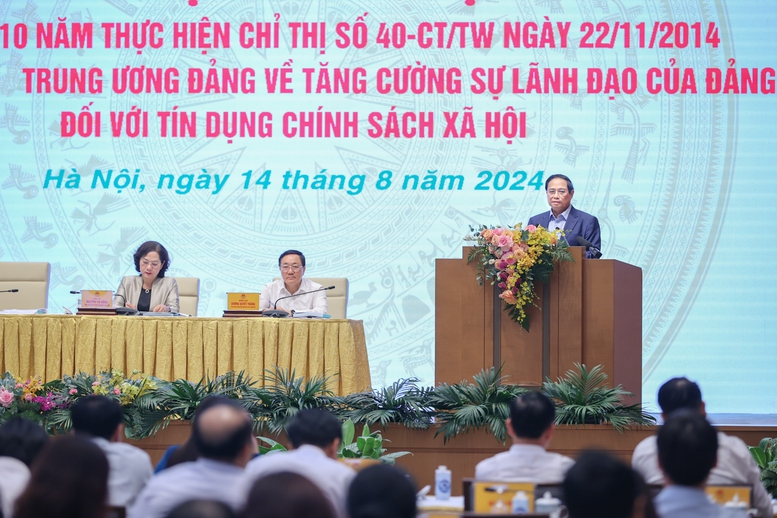
Prime Minister Pham Minh Chinh outlined six major orientations for the future to ensure that social policy credit continues to be a “bright spot” and a “pillar” of the social security system.
‘Bright spot’ and ‘pillar’ of the social security system
Speaking at the conference, Prime Minister Pham Minh Chinh emphasized that the consistent and unwavering policy of the Party and State is to pursue economic development in tandem with social progress and equality, ensuring that all citizens benefit from socio-economic progress; not to sacrifice social progress, equality, and security, and the environment for economic growth alone; with the spirit of “all together development”, “leaving no one behind”, sharing, doing, enjoying, and winning together.
Combining economic growth with social progress and equality, narrowing the rich-poor gap, and implementing good social security policies are both the goal and the driving force for the country’s sustainable development.
According to the Prime Minister, with the achievements after more than a decade of the whole political system joining hands, social policy credit has become a “bright spot” and a “pillar” in the system of poverty reduction and social security policies, meeting the aspirations of the people, especially the poor and vulnerable groups in society.
The conference reviewed and evaluated the achievements, limitations, and shortcomings and drew valuable lessons from the 10-year implementation of Directive No. 40-CT/TW.
The Prime Minister assigned the Government Office and the Vietnam Bank for Social Policies to synthesize and absorb the comments, suggestions, and recommendations of the delegates and report to the Government and the Prime Minister to advise and propose to the Politburo and the Secretariat (through the Central Economic Commission) to issue appropriate documents to continue enhancing the Party’s leadership over social policy credit in the new context.
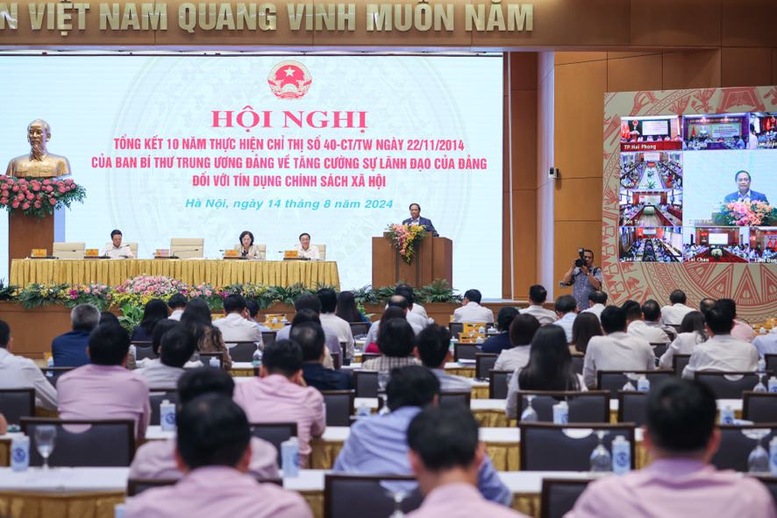
The Prime Minister clarified: It is necessary to continue to affirm that social policy credit is an important solution to implementing the guidelines, policies, goals, and tasks of the Party and State on combining economic growth with social progress and equality…
The Prime Minister outlined six main achievements in the implementation of Directive No. 40 over the past 10 years.
First, the levels, sectors, and localities from the central to local levels, and the Vietnam Bank for Social Policies have identified the direction of social policy credit as one of the key tasks in the regular programs and plans of the localities and units.
Second, the Vietnam Bank for Social Policies has continuously improved the effectiveness of its organizational model and management methods for social policy credit, which are creative and suitable to the Vietnamese context. It has promoted the leadership role of the Party, the management role of the State, the companionship of the entire political system, and mobilized the strength of the people in participating in the management and supervision of the implementation of the State’s preferential credit policies for the poor and policy beneficiaries.
The Vietnam Bank for Social Policies has been assessed by the World Bank as “the largest microfinance service provider in Vietnam and one of the largest microfinance banks in Asia, and one of the few successful and sustainable models in the world. The development journey of the Vietnam Bank for Social Policies offers valuable lessons and experiences for the governments of other developing countries.”
Third, the Vietnam Bank for Social Policies has focused on mobilizing a large and diverse source of capital, with continuous annual growth, creating a large resource to gradually expand the subjects and increase the loan level to meet the capital needs of the poor and policy beneficiaries in a more timely and effective manner.
Over the past 10 years, it has mobilized an additional VND 238,338 billion (2.8 times higher than before the implementation of the Directive), bringing the total social policy credit capital to VND 373,010 billion, with an average annual growth rate of 10.8%.
A notable and commendable point is that 100% of the provincial and district-level localities nationwide have paid attention to balancing and allocating local budgets to entrust to the Vietnam Bank for Social Policies, reaching VND 47,350 billion, an increase of VND 43,542 billion (12.4 times) compared to before the implementation of the Directive.
Fourth, the Vietnam Bank for Social Policies has effectively implemented the Government’s and Prime Minister’s directions in reviewing, studying, amending, and supplementing policies and laws to mobilize, manage, and use social policy credit capital efficiently.
Over the past 10 years, many policies have been issued by the Government and the Prime Minister, such as the policy on lending to newly escaped poor households; preferential lending for buying, renting, or building social housing; lending for socio-economic development in ethnic minority and mountainous areas; lending to people who have completed their prison sentences; policies on lending to support businesses and employees affected by the COVID-19 pandemic…
Fifth, the Vietnam Bank for Social Policies has closely coordinated with local governments and socio-political organizations to quickly and effectively deploy credit programs with an increasing scale.
The total outstanding loans of the credit programs have reached VND 350,822 billion, an increase of VND 221,365 billion (nearly 171%) compared to the end of 2014, with more than 6.8 million poor households and policy beneficiaries, and an average annual growth rate of 10.5%.
Social policy credit capital has been deployed to 100% of communes, wards, and townships nationwide, helping more than 21 million poor households and policy beneficiaries with a lending turnover of VND 733,152 billion. Priority has been given to lending in ethnic minority, mountainous, remote, and difficult areas…
Social policy credit capital has made an important contribution to successfully achieving the goal of multidimensional poverty reduction, inclusiveness, and sustainability, reducing the multidimensional poverty rate from 14.2% in 2011 to 2.93% at the end of 2023 (according to the multidimensional poverty line).
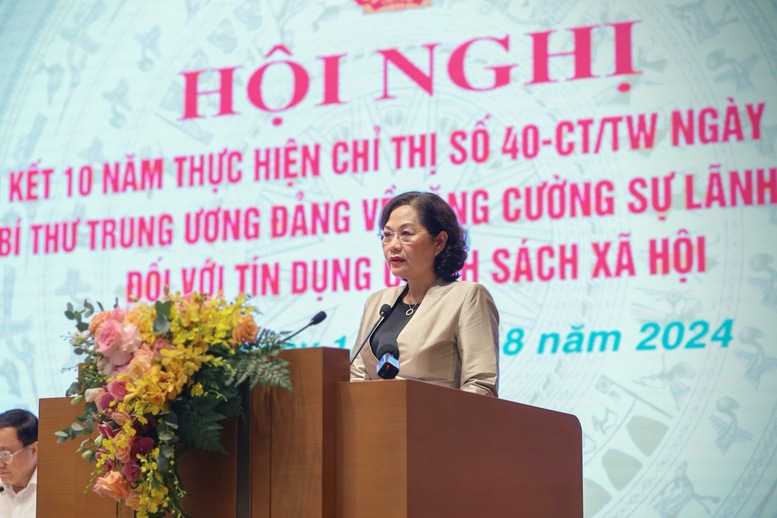
Governor of the State Bank of Vietnam Nguyen Thi Hong speaks at the conference.
Sixth, the Vietnam Bank for Social Policies has paid attention to inspecting and supervising, establishing discipline and order in the direction and administration, and complying with regulations in managing and using the State’s resources in implementing social policy credit.
It has promoted the role of supervision and social criticism of the Fatherland Front and socio-political organizations, especially the role of inspection and supervision of the people under the motto “the people know, the people discuss, the people do, the people check, the people supervise, and the people benefit.”
At the same time, it has promoted the application of information technology, digital transformation, and reform of procedures for handling work; established and implemented 10,455 commune-level transaction points with the method of “transaction at home, disbursement and debt collection at the commune”, a unique feature and strength that no other credit institution or microfinance organization has. In addition, it has paid attention to training and improving the quality of human resources to meet the requirements of the new situation.
On behalf of the Government, Prime Minister Pham Minh Chinh acknowledged, praised, and highly appreciated the proactive and active efforts of the central ministries, sectors, and local authorities, especially the important contributions of the Vietnam Bank for Social Policies in advising and organizing the implementation of Directive No. 40, Conclusion No. 06 of the Secretariat, and the plan to implement the directives and conclusions of the Secretariat issued by the Government and the Prime Minister.
Along with the above achievements, the Prime Minister pointed out that there are still some limitations and shortcomings in the implementation of Directive No. 40 and Conclusion No. 06 of the Secretariat, such as the capital structure is not really reasonable and sustainable; the entrusted capital in some provinces is still limited and has not matched the potential and strengths of local socio-economic development; some credit policies have been adjusted to increase the loan level, but the implementation has been slow (the credit program for clean water supply and sanitation in rural areas, lending to difficult areas…)
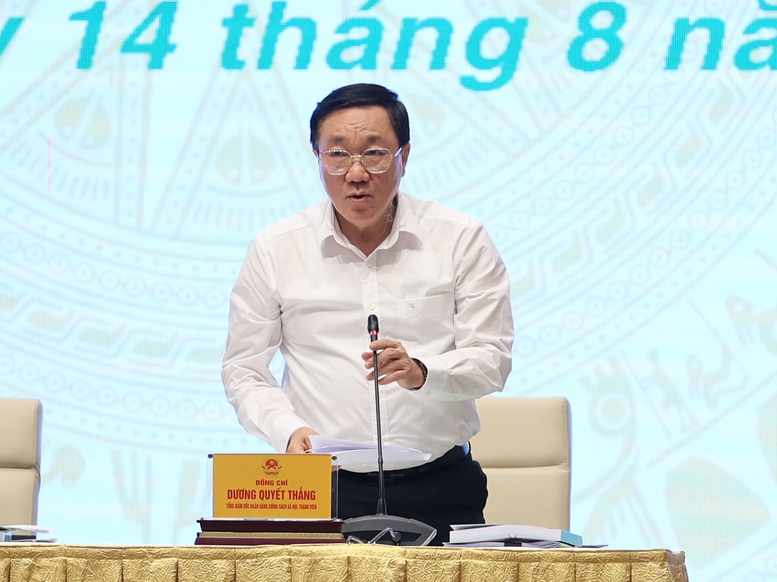
General Director of the Vietnam Bank for Social Policies Duong Quyet Thang speaks at the conference.
Based on the practical implementation of Directive No. 40-CT/TW and Conclusion No. 06-KL/TW of the Secretariat over the past time, the Prime Minister emphasized six lessons learned.
First, the correct and appropriate guidelines and policies of the Party and the resolute and thorough direction of the Government and the Prime Minister, together with the drastic involvement of the entire political system, are important and decisive factors for the successful implementation of Directive No. 40-CT/TW and Conclusion No. 06.
Second, in reality, the localities where the Party committees have focused on leadership and direction, the local authorities have been proactive and drastic, the sectors have closely coordinated in implementing the directives and conclusions of the Secretariat, and there have been specific plans and good implementation of inspection and supervision, the results of implementing the directives and conclusions of the Secretariat in those localities have been high.
Third, the Party leads, the Government manages and directs, the Vietnam Bank for Social Policies advises, the Fatherland Front supervises, and the socio-political organizations coordinate and play an important role in implementing social policy credit.
Fourth, it is necessary to be dedicated, responsible, close to the people, listen to the aspirations of the poor and policy beneficiaries, ensure publicity and transparency, and be supervised by the local authorities and the people, reduce costs for the people, bring social policy credit closer to the people, create conditions and opportunities for those in need of capital, and consolidate the people’s trust in the Party and the State.
Fifth, information and propaganda about policies must be proactive, regular, continuous, timely, and full to all levels, sectors, and people so that they can know, inspect, and supervise at the grassroots level.
Sixth, it is necessary to regularly summarize, evaluate, and draw experiences from the implementation of the directives and conclusions of the Party to set goals, plans, roadmaps, and solutions for effective implementation, suitable to the practical situation.
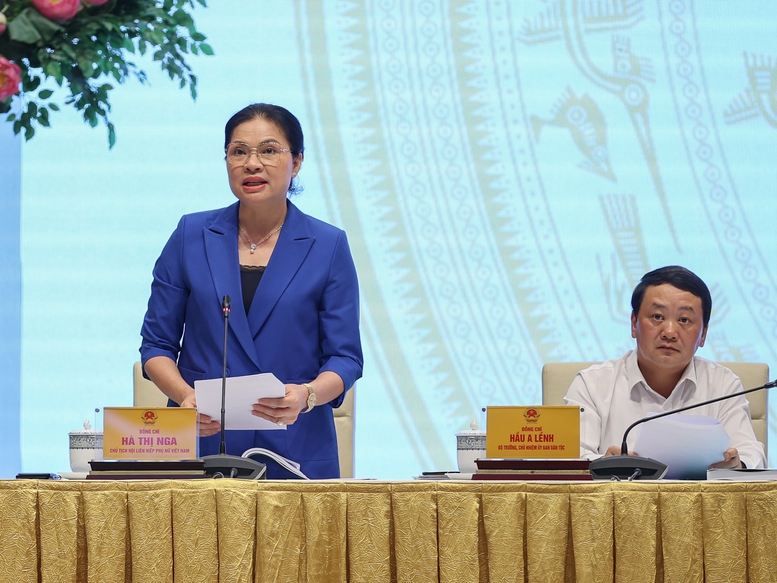
Avoid Out-of-Stock, Hoarding, and Disruptions in Supply Chain Leading to Price Surges
In line with the 2024 mission directive, the Government has set a goal to prevent shortages, hoarding, and disruptions in the supply chain that result in sudden price surges.
Prime Minister demands thorough inspection so that everyone can have Tet
Prime Minister Pham Minh Chinh emphasized the importance of ensuring a safe and joyful Lunar New Year for all citizens. Local authorities and organizations are responsible for making sure that everyone can celebrate the holiday in a healthy, efficient, and inclusive manner, ensuring that no one is left behind and that everyone can enjoy the Lunar New Year festivities.
Prime Minister: Collective economic development is an inevitable trend in the context of international integration.
According to the Prime Minister, collective economic development is an essential trend in the context of international integration, aligning with Vietnam’s socialist-oriented market economy. Collective economic organizations operate with a primary focus on economic benefits while also valuing political, cultural, and social benefits within the local area.




